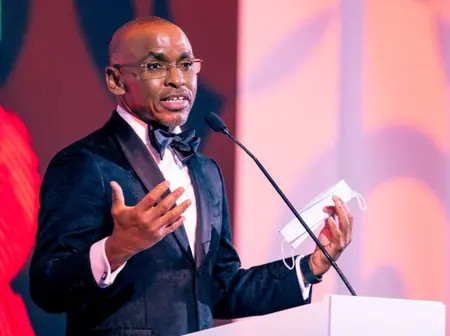Safaricom is turning 25 in October and CEO Peter Ndegwa marked the milestone by reflecting on the telco’s remarkable journey from a Telkom Kenya subsidiary to Kenya’s most valuable enterprise.
In an interview with Developing Telecoms at Vodafone UK headquarters in London, he looked back on his five-year tenure and the bold bets that have kept Safaricom at the top of Africa’s telecom game.
Ndegwa, who joined Safaricom in 2020, now steers a firm that has crossed the US$3 billion revenue mark, delivered US$1.2 billion in operating profit this year, and serving more than 50 million Kenyans.
Safaricom PLC’s mobile network now covers 95 per cent of the population, while its M-Pesa platform continues to dominate with 36 million monthly users.
Despite already being a big, Ndegwa believes Safaricom still has a lot of headroom to expand and he singles out the biggest hurdle the country faces as the affordability of devices.
He noted that only half of Safaricom’s customers own 4G or 5G phones hence its launch of the “Neon” line of low-cost smartphones, assembled locally by East African Device Assembly Kenya.
He, however, noted that the pptake has been improving gradually with 4G usage increasing by 20–30 per cent each year to clock 23 million devices.
The tech-driven company is also expanding its home broadband footprint, with just under 500,000 homes connected so far, against an ambitious target of 2 million.
Safaricom has already laid 18,300km of fibre even as it boasts of 1.1 million 5G customers, with a goal of making all sites 5G-ready by 2029.
Perhaps the boldest chapter in Safaricom’s inspiring story is Ethiopia.
Since it secured the licence in 2021, Safaricom Ethiopia has signed up 10 million customers and built 3,000 mobile sites.
Heavy start-up investments and Ethiopia’s 2024 currency reforms pushed Safaricom Ethiopia losses to Sh61.1 billion but a seemingly unfazed Ndegwa is targeting to break-even by 2027.
“In Ethiopia we’ve reached 10 million customers in three years. It took eight years in Kenya,” he noted.
He pointed out that Ethiopia’s 125 million-strong population, half of them still unconnected, stages a huge potential with Safaricom targeting 15 million subscribers by end of 2025 and nearly 50 million within a decade.
So far, the group has invested US$2.5 billion in Ethiopia, most of it already repaid.
“When Ethiopia turns profitable, we expect double-digit growth across the group,” he said.
Back in Kenya, Safaricom remains the group’s cash cow, with EBIT up 13 per cent to Sh158 billion.
As it marks its 25th anniversary, Safaricom has cemented its status as Kenya’s most valuable company, briefly hitting a US$3 billion market cap with Ndegwa foreseeing a brighter future.
“We started with purpose, then customer focus, and then pushed innovation. We are doing the right things, driven by our desire to create impact,” he concluded.
From 2G calls in the early 2000s to a continental bet in Ethiopia, Safaricom’s next 25 years may prove even more defining than its first.

Leave a Reply